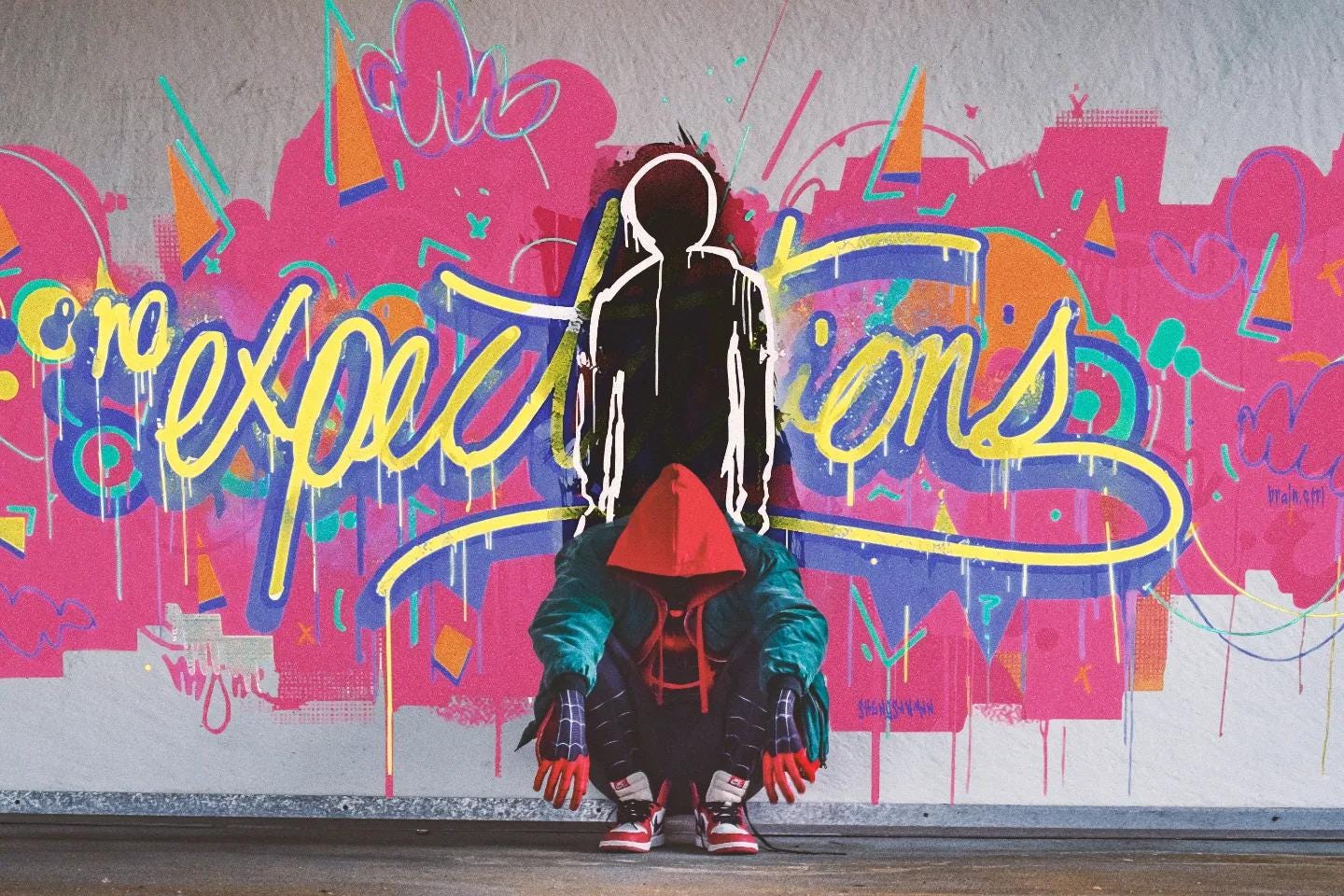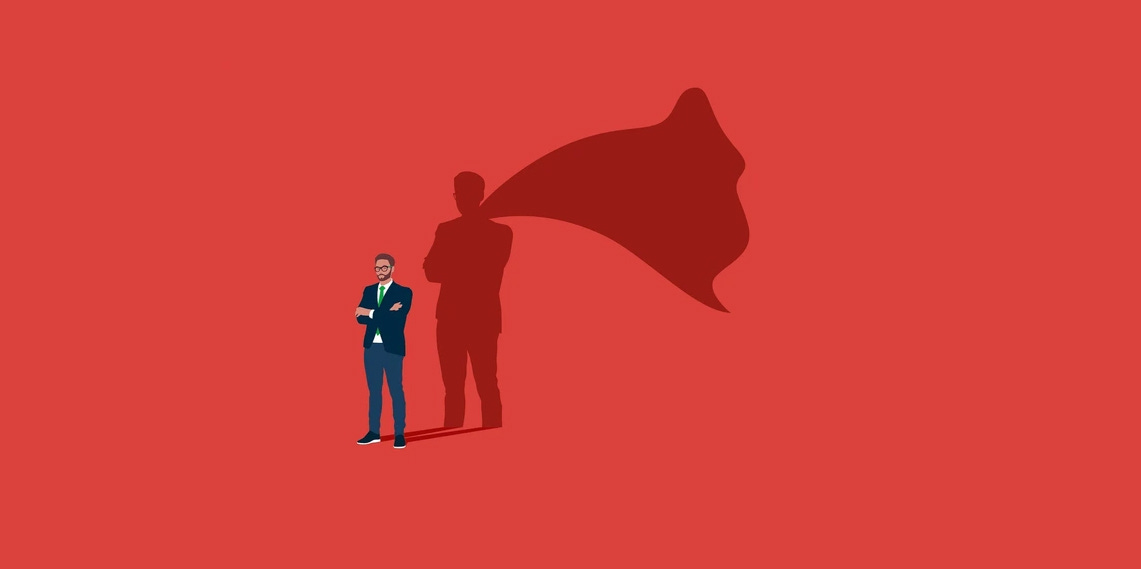Victim Mentality / Hero Mindset
Turn Setbacks into Strengths: Embracing a Hero's Mindset
I'm Manuel Saez, I write to help founders master emotional intelligence to make decisions with clarity and confidence 🌻 EQ coach, 2X-founder & award-winning designer ➜ I love fixing old motorcycles 🛵 🏍
Reading time: 9 min.
Contents:
Recognizing Victim Mentality
Our Trauma Shapes Our Perception
The Unpredictability of Life
Letting Go of Expectations
Finding Gratitude in Difficult Times
The Hero Mindset
Some days carry the relentless weight of defeat, pressing down on your shoulders before you can catch your breath.
Today was one of those days for me, and it felt especially heavy.
I needed a win. Instead, I got a setback. It felt like someone had added even more weight to an already overwhelming load.
We all have days like these, but what made it harder for me was the familiar sting of past trauma resurfacing, making this setback feel more like a pattern of bad luck than just a bad day.
I caught myself thinking, “Why can’t I catch a break?” The sense of unfairness was strong—I felt tired, beaten, powerless, and, yes, angry.
But then, a realization hit me.
I was slipping into a victim mindset, a place I’ve found myself in before and never liked.
Over the years, I’ve learned to recognize when I’m in that space and make a conscious choice to shift.
With that awareness, I decided I wouldn’t stay stuck there. I wouldn’t let myself be a passive observer in my own story.
Instead, I chose to fight back and reclaim my power.
Falling into the victim trap is common; we’ve all been there. The key is recognizing it and shifting from feeling like a victim to embracing the hero mindset.
Victims wait for someone to solve their problems; heroes take charge and shape their destinies.
These are the insights I’ve gained about moving from victim to hero that might resonate with you, too.
Recognizing Victim Mentality
The first step to recognizing if we’re slipping into a victim mindset is becoming aware of how we view the world.
Life can feel unpredictable and unfair, and it’s easy to believe everything is working against us—especially when “bad luck” stretches beyond a single day and lingers for weeks.
I’ve been there—frustrated by setbacks in my personal and professional life, watching others who seemed less qualified and barely trying to succeed while I struggled.
It’s normal to slip into thoughts like, “Why does this always happen to me?” or, “This isn’t fair.” But staying in that mindset only holds us back from moving forward.
Victim mentality is tricky because it often feels justified. Life is undeniably hard, and setbacks are real.
But when we see ourselves as victims, we give away our power. We surrender the ability to respond with resilience and take meaningful action.
This is why recognizing these behaviors is crucial—it’s the first step toward making a change.
Our Trauma Shapes Our Perception
Trauma is like a shadow we can’t shake off, growing more vivid when we face setbacks.
When I fall into victim mode, I’ve noticed that past trauma can amplify feelings of unfairness and helplessness.
Sometimes, small setbacks that I associate with past trauma can trigger a flood of memories, making the present challenge feel even more overwhelming.
When I was fundraising for my startup, I faced multiple rejections. Despite putting in the hard work and believing I had a strong pitch, the funding didn’t come through.
The rejection stung even more because it brought up old feelings of inadequacy and unfairness. It took me back to my teen years when I wasn’t selected to play for my regional rugby team. Back then, I was confident in my skills, but others with fewer qualifications and better connections were chosen instead.
That familiar feeling of being overlooked despite doing everything right resurfaced during the fundraising experience and made the setback feel even more unjust. It wasn’t just about this one moment; it tapped into a deeper pattern of feeling disregarded.
Understanding this connection allowed me to shift my mindset from powerless to proactive, reminding myself that I could choose how to respond and move forward. Recognizing this link can be eye-opening and the first step in moving from victim to hero.
The Unpredictability of Life
Life’s unpredictability can make it feel unfair, but it’s the meaning we give to life events that shape our experience.
One moment, everything might be going smoothly, and the next, an unexpected challenge can throw everything off course.
I’ve learned that while we can’t always control what happens, we can control how we respond. Dwelling on the past or worrying about the future only creates anxiety and stress.
Accepting life’s unpredictability helps us let go of the need for control and stay focused on the present. This acceptance doesn’t mean abandoning your goals or not striving for success. It means being ready to adapt when things don’t go as planned.
Paradoxically, life’s unpredictability can be a blessing. It’s what makes life exciting and full of possibilities for growth. Embracing the unknown can lead to unexpected opportunities and personal breakthroughs.
Letting Go of Expectations
When we’re deeply invested in a certain outcome, it’s easy to feel a sense of injustice when things don’t work out as planned.
I’ve experienced the disappointment and frustration of unmet expectations, and I know firsthand that dwelling on these emotions doesn’t help. Learning to let go of expectations has consistently brought me peace of mind.
One approach that has helped me is having a Plan B. Knowing there are other options can reduce my dependency on one particular result, making setbacks feel less overwhelming.
Practicing mindfulness has also been crucial—becoming aware of when I’m slipping into obsessive or negative thoughts, pausing, and bringing my attention back to the present moment. It reminds me to focus on what I can control. While I can’t always control the outcome, I can control the effort I put into the process and how I respond to challenges.
Cultivating gratitude has been a powerful tool. By focusing on what I already have rather than what’s missing, I shift my perspective to one of abundance, which helps ease the disappointment of unmet expectations.
Finding Gratitude in Difficult Times
When life deals you a bad hand or two, it can feel impossible to see any good in the situation.
You did everything right—you put in the hours, you have the talent—and yet things still don’t go your way. Being told to find gratitude in moments like these can feel absurd, even insulting.
But as you gain awareness of your emotions and learn to separate your worthiness from what happened, you start to see beyond the negative.
You begin to find the lessons, the hidden good, and the wisdom that comes from facing hardship.
Even in the darkest moments, there is always something to appreciate.
Here is what has worked for me:
Reflect on Lessons Learned: Hardships often come with lessons that reveal more about ourselves than success ever could. Take time to think about what the experience is teaching you. Did it push you to develop new skills, rethink your approach, or strengthen your resilience? Journaling about these insights can help solidify them and remind you of your growth the next time you face a challenge.
Remember Universal Struggles: When going through a tough time, it’s easy to feel alone in your pain. But no one is immune to challenges. Remembering that everyone faces difficulties can put your struggle into perspective and remind you that hardship is part of the shared human experience. Talking to others about their challenges can help you see that you’re not alone and that overcoming obstacles is possible.
Appreciate What You Have: Gratitude doesn’t have to come from monumental moments. It can be found in the simplest aspects of life. Take a moment to appreciate the laughter of your children, the unwavering support of friends, or the quiet comforts of a familiar routine. These small moments, when acknowledged, can create powerful shifts in your mindset, helping you focus on what’s still good and grounding you in the present.
The Hero Mindset
We all carry a hero inside.
Heroes take charge and make the world happen for them. They don’t wait for things to change—they lead the change.
Yet, sometimes, we get so deep into our problems that we fail to see our own power.
Being a hero is not easy, especially when we’re emotionally exhausted. In those moments, it’s easier to slip into a victim mentality, feeling like life is happening to us rather than for us.
It’s tempting to wait for someone to come and save us. But the truth is, no one is coming. Holding onto that belief only reinforces a victim mindset.
To shift out of that space, you must become your own hero. This means stepping up, taking responsibility, and making intentional choices, even when it’s hard.
Heroes don’t accept defeat easily, and they don’t take nonsense from anyone. They lead their own lives with determination and resilience.
Embracing the hero mindset means making choices, focusing on the positive, and building strength, especially during tough times.
Here’s what a hero mindset looks like in action:
Take Ownership: Heroes own their circumstances and decisions. They don’t blame others or external factors; instead, they ask, “What can I do to change this?” This perspective empowers them to act and create solutions. By taking full responsibility for their actions and outcomes, heroes reclaim their power and influence over their journey.
Find Joy in Simple Moments: Heroes know the importance of recharging and finding joy in everyday life. Savoring small moments—a good cup of coffee, a walk in nature, or a few minutes of quiet—helps build inner strength and resilience. These small acts remind heroes that happiness can be cultivated regardless of external conditions, reinforcing their emotional well-being.
Surround Themselves with Positivity: Heroes choose to be around people who uplift and inspire them and engage in activities that bring joy and foster growth. This keeps their mindset strong and positive. More importantly, heroes strive to be a source of positivity themselves, creating an environment that uplifts others, supports their ambitions, and nurtures collective resilience.
Stay Grateful: Practicing gratitude helps heroes stay grounded. They focus on what’s good in their lives, even during tough times, reinforcing resilience and preventing negativity from taking over. This daily practice of acknowledging what they have, rather than focusing on their lack, helps maintain a balanced and hopeful perspective.
Keep a Forward Focus: Heroes don’t dwell on failures. Instead, they see setbacks as opportunities to learn and adapt. They maintain an optimistic outlook and believe in their ability to overcome challenges. By shifting their focus to what lies ahead, heroes are better equipped to navigate difficulties with confidence and purpose.
Embrace Change: Heroes adapt to change rather than resist it. They understand that flexibility is key to growth and view change as an opportunity to evolve rather than a threat. This adaptability allows them to remain open to new possibilities, learning from each experience and growing stronger with every shift.
Take Calculated Risks: Heroes aren’t reckless but don’t shy away from taking risks that align with their goals. They evaluate their options, trust their instincts, and confidently move forward, knowing that progress often requires stepping out of their comfort zone. This willingness to take strategic risks helps heroes break new ground and reach higher achievements.
Act with Integrity: Heroes stand by their values, even when it’s difficult. They act with honesty and maintain their principles, leading by example and inspiring those around them. Integrity reinforces trust and respect, allowing heroes to navigate challenges while staying true to who they are and what they believe.
Empower Others: Heroes don’t just focus on their own journey; they lift others up along the way. They offer support, share knowledge, and inspire those around them to reach their full potential. By empowering others, heroes build a network of strong, capable individuals who contribute to a shared vision of growth and success.
Stay Committed: Heroes remain committed to their goals, even when the path is tough. They push through obstacles with determination, knowing that perseverance is what separates success from giving up. This unwavering commitment helps them stay focused on their mission, turning setbacks into stepping stones toward progress.
Life’s unpredictability can feel daunting, and the sense of unfairness can make it easy to slip into a victim mentality. However, by recognizing these patterns and adopting a hero mindset, we shift from feeling powerless to taking charge of our own story.
Heroes take ownership, embrace change, and focus on the positive even when faced with challenges. They lead their journey with resilience and seek growth in every moment.
I hope sharing my experiences and insights helps you navigate your own challenges and empowers you to step into your hero mindset.
Sending you good vibes 🌻
Manuel Saez






